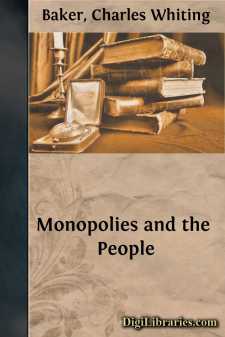Categories
- Antiques & Collectibles 13
- Architecture 36
- Art 48
- Bibles 22
- Biography & Autobiography 813
- Body, Mind & Spirit 142
- Business & Economics 28
- Children's Books 17
- Children's Fiction 14
- Computers 4
- Cooking 94
- Crafts & Hobbies 4
- Drama 346
- Education 46
- Family & Relationships 57
- Fiction 11829
- Games 19
- Gardening 17
- Health & Fitness 34
- History 1377
- House & Home 1
- Humor 147
- Juvenile Fiction 1873
- Juvenile Nonfiction 202
- Language Arts & Disciplines 88
- Law 16
- Literary Collections 686
- Literary Criticism 179
- Mathematics 13
- Medical 41
- Music 40
- Nature 179
- Non-Classifiable 1768
- Performing Arts 7
- Periodicals 1453
- Philosophy 64
- Photography 2
- Poetry 896
- Political Science 203
- Psychology 42
- Reference 154
- Religion 513
- Science 126
- Self-Help 84
- Social Science 81
- Sports & Recreation 34
- Study Aids 3
- Technology & Engineering 59
- Transportation 23
- Travel 463
- True Crime 29
Monopolies and the People
Categories:
Description:
Excerpt
I.
THE PROBLEM PRESENTED.
The word "trust," standing for one of the noblest faculties of the heart, has always held an honorable place in our language. It is one of the strange occurrences by which languages become indelible records of great facts in the history of the world, that this word has recently acquired a new meaning, which, to the popular ear at least, is as hateful as the old meaning is pleasant and gratifying.
Some future generation may yet be interested in searching out the fact that back in the nineteenth century the word "trust" was used to signify an obnoxious combination to restrict competition among those engaged in the same business; and that it was so called because the various members of the combination entrusted the control of their projects and business to some of their number selected as trustees. We of the present day, however, are vitally interested in a question far more important to us than the examination of a curiosity of philology. We are all of us directly affected to-day by the operation of trusts; in some cases so that we feel the effect and rebel under it; in other cases, so that we are unconscious of their influence and pay little heed to their working.
It is but a few months since public attention was directed to the subject of trusts; but, thanks to the widespread educational influence of the political campaign, at the present day the great proportion of the voters of the country have at least heard of the existence of trusts, and have probably some idea of their working and their effect upon the public at large. They have been pointed out as a great and growing evil; and few speakers or writers have ventured to defend them farther than to claim that their evil effects were exaggerated, and predict their early disappearance through natural causes; but while remedy after remedy has been suggested for the evil so generally acknowledged, none seems to have met with widespread and hearty approval, and practically the only effect thus far of the popular agitation has been to warn the trust makers and trust owners that the public is awakening to the results of their work and is likely to call them to account.
The truth is, as we shall see later, that it is a difficult matter to apply an effective remedy of any sort to the trusts by legislation, without running counter to many established precedents of law and custom, and without serious interference with what are generally regarded as inalienable rights. Yet we are making the attempt. Already legislative and congressional committees have made their tours of investigation, and bills have been introduced in the legislatures of many of the States, and in Congress, looking to the restriction or abolition of trust monopolies.
It is the wise surgeon, however, who, before he takes the knife to cut out a troublesome growth, carefully diagnoses its origin and cause, determines whether it is purely local, or whether it springs from the general state of the whole body, and whether it is the herald of an organic disease or merely the result of repressed energies or wrongly-trained organs. So we, in our treatment of the body politic, will do well to examine most carefully the actual nature of the diseases which we seek to cure, and discern, if we can, the causes which have brought them on and tend to perpetuate them. If we can discover these, we shall, perhaps, be able to cure permanently by removing the ultimate cause. At any rate, our remedies will be apt to reach the disease far more effectually than if they were sought out in a haphazard way.
The crudest thinker, at the first attempt to increase his knowledge of the general nature of trusts, discovers that the problem has a close connection with others which have long puzzled workers for the public good. Trusts ally themselves at once in his mind with monopolies, in whichever form he is most familiar with them, and are apt to be classed at once, without further consideration, as simply a new device for the oppression of the laborer by the capitalist....


